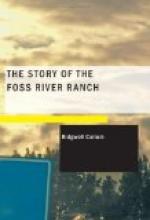There was an instant’s thrilling pause. Then Lablache’s hand flew to his pocket. He had heard the click of a cocking revolver.
For the moment the rancher’s old spirit rose superior to his senile debility.
“God in heaven! And this is how you’ve robbed me, you—you bastard!”
“Poker” John’s seared face was at that moment the face of a maniac. He literally hurled his fury at the money-lender, who was now standing confronting him.
“It is the last time, if—if I swing for it. Prairie law you need, and, Hell take you, you shall have it!”
He swung himself half round. Simultaneously two reports rang out. They seemed to meet in one deafening peal, which was exaggerated by the smallness of the room. Then all was silence.
Lablache stood unmoved, his yellow eyeballs gleaming wickedly. For a second John Allandale swayed while his face assumed a ghastly hue. Then in deathly silence he slowly crumpled up, as it were. No sound passed his lips and he sank in a heap upon the floor. His still smoking pistol dropped beside him from his nerveless fingers.
The rancher had intended to kill Lablache, but the subtle money-lender had been too quick. The lashless eyes watched the deathly fall of the old man. There was no expression in them but that of vengeful coldness. He was accustomed to the unwritten laws of the prairie. He knew that he had saved his life by a hair’s-breadth. His right hand was still in his coat pocket. He had fired through the cloth of the coat.
Some seconds passed. Still Lablache did not move. There was no remorse in his heart—only annoyance. He was thinking with the coolness of a callous nerve. He was swiftly calculating the effect of the catastrophe as regarded himself. It was the worst thing that could have happened to him. Shooting was held lightly on the prairie, he knew, but—Then he slowly drew his pistol from his pocket and looked thoughtfully at it. His caution warned him of something. He withdrew the empty cartridge case and cleaned out the barrel. Then he put a fresh cartridge in the chamber and returned the pistol to his pocket. He was very deliberate, and displayed no emotion. His asthmatical breathing, perhaps, might have been more pronounced than usual. Then he gathered up the cards from floor and table, and wiped out the score upon the wall. He put the cards in his pocket. After that he stirred the body of his old companion with his foot. There was no sound from the prostrate rancher. Then the money-lender gently lowered himself to his knees and placed his hand over his victim’s heart. It was still. John Allandale was dead.
It was now for the first time that Lablache gave any sign of emotion. It was not the emotion of sorrow—merely fear—susperstitious fear. As he realized that the other was dead his head suddenly turned. It was an involuntary movement. And his fishy eyes gazed fearfully behind him. It was his first realization of guilt. The brand of Cain must inevitably carry with it a sense of horror to him who falls beneath its ban. He was a murderer—and he knew it.




